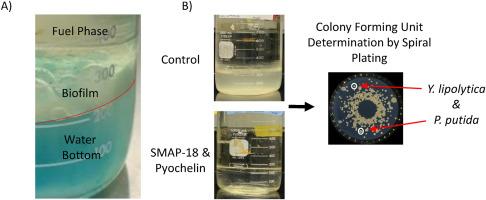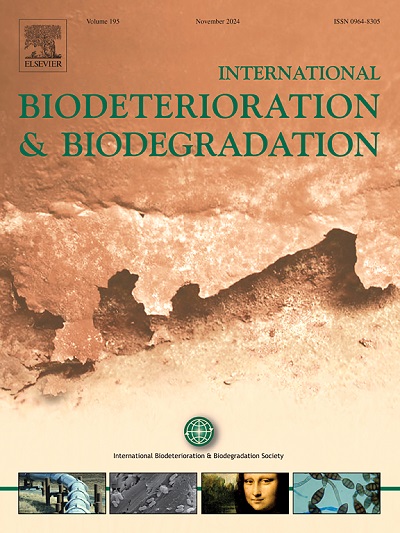Use of sheep myeloid antimicrobial peptide (SMAP-18) and siderophore Pyochelin for mitigation of aerospace fuel-degrading microbes
IF 4.1
2区 环境科学与生态学
Q2 BIOTECHNOLOGY & APPLIED MICROBIOLOGY
International Biodeterioration & Biodegradation
Pub Date : 2024-10-29
DOI:10.1016/j.ibiod.2024.105943
引用次数: 0
Abstract
Sustainment of aviation fuel infrastructure is expensive and requires frequent testing for hydrocarbon-degrading microbes to assure safeguarding of fuel quality and engineering systems. Microbial contaminants in Jet fuel, including Gram-positive and Gram-negative bacteria, yeast, and filamentous fungi, necessitate early action to prevent biofouling and biocorrosion. Recent studies have identified two novel antimicrobial agents, the sheep myeloid antimicrobial peptide SMAP-18 and the iron chelating siderophore, Pyochelin with potential suitable antimicrobial properties for jet fuel sustainment. This study evaluates the antimicrobial activity of SMAP-18 and Pyochelin in specialized antimicrobial assays including liquid and fuel-culture minimum inhibitory concentration (MIC) testing, small-scale (25 mL) and large-scale (1 L) Jet A fuel microbial consortium cultures. The results show that repetitive dosing of combined SMAP-18 and Pyochelin is bactericidal and able to control bio-contaminant progression of Gram-positive Gordonia sp., and Gram-negative Pseudomonas putida bacteria in jet fuel. Moreover, the synergy observed between SMAP-18 and Pyochelin highlights their complementary mechanisms of action against microbial targets resulting in complete elimination of bacterial growth with a −7.9 log fold reduction through day 24.

利用羊髓抗菌肽(SMAP-18)和嗜硒酸 Pyochelin 减少航空燃料降解微生物的危害
航空燃料基础设施的维护费用昂贵,需要经常检测碳氢化合物降解微生物,以确保燃料质量和工程系统的安全。喷气燃料中的微生物污染物包括革兰氏阳性和革兰氏阴性细菌、酵母菌和丝状真菌,因此有必要及早采取措施防止生物污垢和生物腐蚀。最近的研究发现了两种新型抗菌剂,一种是绵羊骨髓抗菌肽 SMAP-18,另一种是铁螯合苷元 Pyochelin,这两种抗菌剂都具有潜在的适用于喷气机燃料维持的抗菌特性。本研究在专门的抗菌试验中评估了 SMAP-18 和 Pyochelin 的抗菌活性,包括液体和燃料培养物最小抑菌浓度 (MIC) 测试、小规模(25 mL)和大规模(1 L)喷气 A 型燃料微生物联合体培养物。结果表明,重复施用 SMAP-18 和 Pyochelin 复方制剂具有杀菌作用,能够控制喷气燃料中革兰氏阳性的戈登氏菌和革兰氏阴性的假单胞菌的生物污染进展。此外,在 SMAP-18 和 Pyochelin 之间观察到的协同作用突显了它们针对微生物目标的互补作用机制,从而彻底消除了细菌的生长,使其在第 24 天的生长速度降低了 -7.9 对数倍。
本文章由计算机程序翻译,如有差异,请以英文原文为准。
求助全文
约1分钟内获得全文
求助全文
来源期刊
CiteScore
9.60
自引率
10.40%
发文量
107
审稿时长
21 days
期刊介绍:
International Biodeterioration and Biodegradation publishes original research papers and reviews on the biological causes of deterioration or degradation.

 求助内容:
求助内容: 应助结果提醒方式:
应助结果提醒方式:


